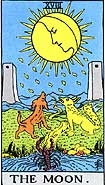Ayn Rand
(Equivalent of "2/2/1905") (Equivalent of "Alisa Rosenbaum")
(Equivalents of "2/2/1905") Akira Kurosawa, Ayn Rand, B. F. Skinner, Dick Cheney, George Washington, L. Ron Hubbard, Larry Flynt, Mikhail Gorbachev, Neil Gaiman, Walt Disney, Werner Heisenberg, Will Wright
(Equivalents of "Ayn Rand") Words that embody your presence are "Butcher, Council, Engineer, Glory, Mouth, Player, Power, Stars, Theater".
ExplanationTarot Card: This is the card whose numeric value matches that of a birthdate. For example, George S. Patton (one of the greatest generals of World War II) was born on 11/11/1885. The numeric value of this date is 8, which associates with the 8th Tarot card, The Chariot - the symbol of victory through might and advancement through bold action. Note: Because the 1st Tarot card (The Fool) is labeled with the number 0, the card associated with a given birth path is always labeled with a number 1 less than the birth path itself. For example, the birth path 22 is associated with the 22nd Tarot card (The World), which is labeled with the number 21. Rune: This is the rune whose numeric value matches that of a birth name. For example, Robert Oppenheimer (the father of the atomic bomb) was born under the rune Tyr, which symbolizes a great victory earned at a terrible price - a rather poetic summary of our entry into the Atomic Age. Birth Mates: These are people whose birthdate is an exact numeric match. For example, Madonna (fashion icon starting in the 1980s) was born on 8/16/1958, and Coco Chanel (fashion icon starting in the 1920s) was born on 8/19/1883 - both dates have a numeric value of 38. Birth mates share many of the same challenges, opportunities, and choices in life, which often leads them to share similar roles in society. The Public Role and Private Persona are composed of words that equate to a person's public name and nickname. The different ways that words may be associated with names are: Identity: These are words whose numeric value is an exact match. For example, the numeric value of "Adolf Hitler" is 110, which is the same numeric value as "Osama bin Laden" (as bad luck would have it, Adolf and Osama share the same Tarot card and birth path as well). Identities are common in some fundamental way, although the commonality may be very obscure. You might think of words as the siblings of their identities. Another interesting example of identity is "Death" and "Change", both words with a numeric value of 38. Product: These are words whose numeric value is a superset of another. For example, the numeric value of "Fulfillment" is 130, which is a superset of the numeric value of "Peace", which is 30. Products are things that you can create from their components. Component: These are words whose numeric value is a subset of another. For example, the numeric value of "Sex" is 48, which is a subset of the numeric value of "Sharon Stone", which is 148. Components are things that make up a product. Mirror: These are words whose numeric value is a digit by digit reflection. For example, the numeric value of "Rose" is 57, whereas the numeric value of "Thorn" is 75. Mirrors are things that belong together, either as compliments or as opposites. Like a thorn to a rose, mirrors are often unrelated in what they offer, but inextricably connected nonetheless. Words are sometimes thought of as the allies or enemies of their mirrors. Another interesting example of a mirror is "Romance" (whose numeric value is 69!) and "Playboy" (whose numeric value is 96). Cause: These are words whose value matches the secondary numeric value of another. For example, the date "9-11-2001" has a numeric value of 14 (9+1+1+2+0+0+1=14), the word "Warning" has a numeric value of 86, and the word "Martyr" has a numeric value of 95. If you add up the digits of "Warning" (8+6=14) and "Martyr" (9+5=14), the results equal the value of "9-11-2001". Causes are things that precede their effects. Effect: These are words whose secondary numeric value matches the value of another. For example, the numeric value of "Winter" is 89, and the numeric value of "Ice" is 17. If you add up the digits of "Winter" (8+9=17), the result equals the value of "Ice" (17). Effects are things that follow their cause. Distant: These are words whose secondary numeric values are an exact match. For example, the numeric value of "Rome" is 51, "War" is 42, and "Conquest" is 114. If you add up the digits (5+1=6, 4+2=6, 1+1+4=6), each one equals 6. Distants are things that are loosely related, like cousins within a family. Italics: The words in your reading that appear in italics are more strongly associated with you than the other words in the same category. For example, if your reading included the line "Distant: trance, struggle, victory", then all three of these words would be loosely related to you, but the word struggle would be the most significant among them. |
|||||||
| Copyright 1993-2026 Facade. All rights reserved. Copying any image or other content on Facade is strictly prohibited. The services of Facade are provided for entertainment purposes only. Please view our Privacy Policy and our Terms and Conditions of Use. |

